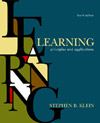| action-specific energy | An internal force that motivates a specific action.
|
 |
 |
 |
| appetitive behavior | Instinctive or learned response motivated by action-specific energy and attracted to a sign stimulus.
|
 |
 |
 |
| A state | The initial affective reaction to an environmental stimulus in opponent-process theory.
|
 |
 |
 |
| B state | The opposite affective response that is elicited by the initial affective reaction, or A state, in opponent-process theory.
|
 |
 |
 |
| dishabituation | The recovery of a habituated response as the result of the presentation of a sensitizing stimulus.
|
 |
 |
 |
| displacement | In a conflict situation, the occurrence of a behavior unrelated to that conflict.
|
 |
 |
 |
| evolution | The changes in the physical and behavioral characteristics that occur over many generations when the environment of that species slowly changes.
|
 |
 |
 |
| fixed action pattern | An instinctive response that is released by the presence of an effective sign stimulus.
|
 |
 |
 |
| habituation | A decrease in responsiveness to a specific stimulus as a result of repeated experience with it.
|
 |
 |
 |
| ingestional neophobia | The avoidance of novel foods.
|
 |
 |
 |
| innate releasing mechanism (IRM) | A hypothetical process by which a sign stimulus removes the block on the release of the fixed action pattern.
|
 |
 |
 |
| opponent-process theory | The theory that an event produces an initial instinctive affective response, which is followed by an opposite affective reaction.
|
 |
 |
 |
| sensitization | An increased reactivity to all environmental events following exposure to an intense stimulus.
|
 |
 |
 |
| sign stimulus | A distinctive environmental event that can activate the IRM and release stored energy.
|
 |
 |
 |
| tolerance | Reduced reactivity to an event with repeated experience.
|
 |
 |
 |
| withdrawal | An increase in the intensity of the effective opponent B state following the termination of the event.
|



 2002 McGraw-Hill Higher Education
2002 McGraw-Hill Higher Education